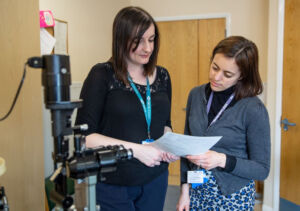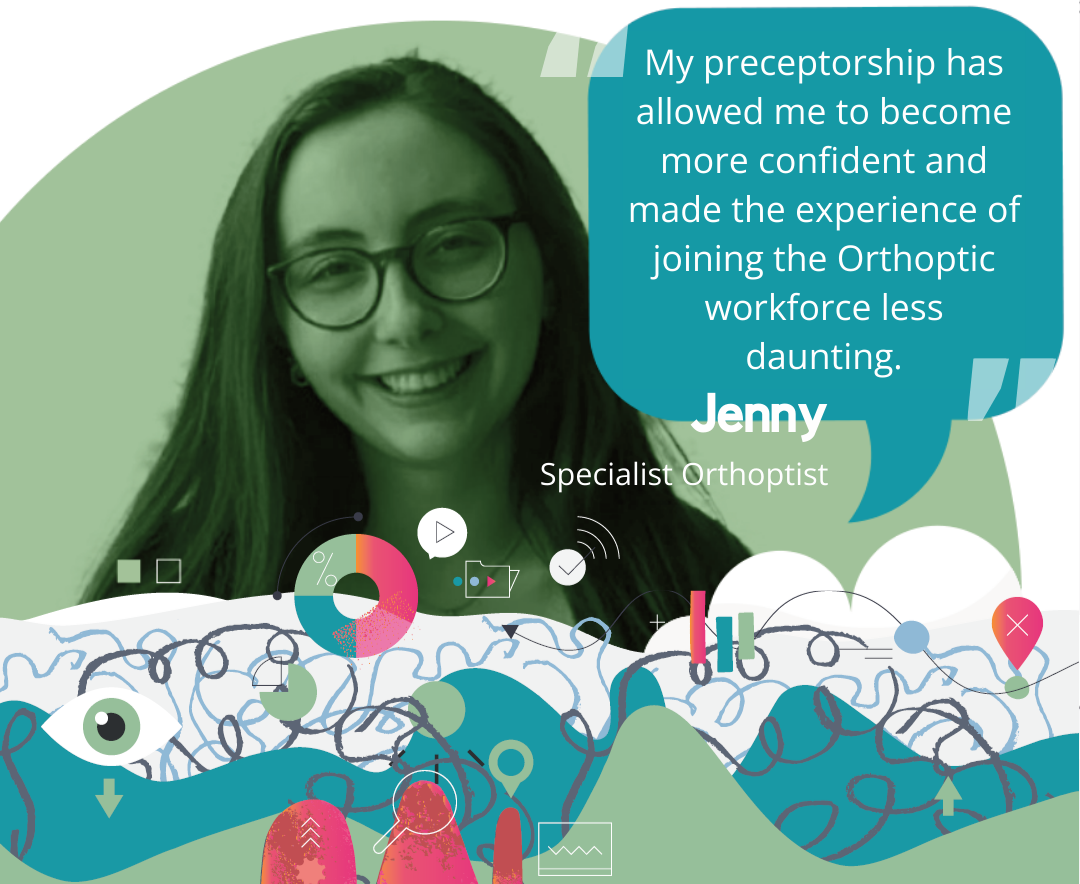Preceptorship plays a vital role in supporting newly qualified orthoptists as they transition from education into professional practice. A consistent, high-quality preceptorship experience not only builds confidence and competence but also strengthens recruitment, retention, and long-term career development across the profession.
Why This Matters
The 2025 Orthoptic Preceptorship Project was launched to address several key challenges:
- Variation in preceptorship offers across services.
- HCPC attrition figures highlight early-career risks.
- The need to improve recruitment and retention in orthoptics.
By evaluating current practice and gathering insights from new graduates, the project developed recommendations to help embed preceptorship as a foundation of professional success.
What We’ve Achieved So Far
The project delivered:
✅ Scoping Current Practice
A comprehensive review of how preceptorship is offered across orthoptic departments.
✅ Minimum Standards and Clear Expectations
Agreed standards outlining what effective preceptorship should look like in every service.
✅ 17 Actionable Recommendations
Structured around four strategic themes to guide implementation.
✅ Publication of Guidance
Accessible resources now available via the BIOS website to support consistent, high-quality delivery.
You can read the full report at Preceptorship Report 2025
What Good Preceptorship Looks Like
The project also highlighted success stories and effective approaches already making a difference:
- Offering preceptorship at interview, showing early commitment to new graduates.
- Team-based delivery, rather than relying solely on a one-to-one relationship.
- Regular structured meetings and realistic caseload adjustments to create time for reflection.
- Clear pathways to end preceptorship positively, including planning next steps.
These examples show that strong preceptorship:
- Builds professional confidence and belonging.
- Improves job satisfaction and retention.
- Lays the foundation for future careers in advanced practice, education, or leadership.
Four Priorities for Embedding Preceptorship
The recommendations are organised around four priorities:
1️⃣ Clarify Preceptorship
- Define what preceptorship is—and what it is not.
- Reinforce that preceptorship is for everyone, regardless of academic achievement.
- Embed a cycle of continuous improvement to evaluate impact.
- Promote the HCPC Principles for Preceptorship and BIOS resources through targeted campaigns.
2️⃣ Promote Its Value
- Integrate preceptorship principles into pre-registration training.
- Emphasise its role in supporting diverse career pathways.
- Use positive messaging to showcase preceptorship as the foundation for professional growth.
3️⃣ Strengthen Support
- Formalise preceptor training, building on the BIOS Clinical Tutors model.
- Develop peer support networks for preceptors and preceptees.
- Provide clear resources to guide completion and plan next steps.
- Explore the creation of a New Graduate Network within BIOS.
- Recognise that preceptorship is a team effort, not an isolated dyad.
- Consider appointing a BIOS Preceptorship Lead to maintain momentum.
4️⃣ Share Best Practice
- Highlight how services have overcome challenges such as time and caseload pressures.
- Share stories from preceptors, preceptees, and managers.
- Promote tools like the BIOS Job Plan Calculator to support protected time.
- Encourage services to set up preceptorship proactively, with clear expectations and pre-booked meetings.
What Happens Next?
The 2025 Preceptorship Project has created a strong foundation, but sustaining impact will require:
- Continued collaboration with employers, education providers, and professional bodies.
- Funding and resources to develop a national preceptorship framework as a cornerstone of workforce development.
- Ongoing evaluation to measure progress, demonstrate value, and adapt to evolving needs.
By embedding structured, team-based preceptorship across the UK and Ireland, we can:
- Create a supportive culture that attracts new graduates to the profession.
- Reduce early-career attrition through meaningful, consistent support.
- Build strong pipelines into advanced practice, research, and leadership.
- Ensure orthoptics remains a vibrant, forward-looking profession delivering high-quality patient care.
If you are in need of any additional guidance or advice, please contact the new graduate representative who will be more than happy to help.
Transition from student to autonomous practitioner is a challenging yet exciting time. BIOS members have access to a multitude of resources designed to support you in your first few years as a qualified Orthoptist. This includes the BIOS preceptorship programme, career progression guides, new graduate CPD events and guidance on HCPC payment and registration – login to access these resources.
BIOS Preceptorship
Our preceptorship programme is designed to support new graduates through the transition from being a student to becoming a confident newly qualified Orthoptist.

For more information:
Join our New Grad online forum here.
Madeleine Ellis, New Grad Rep [email protected]
